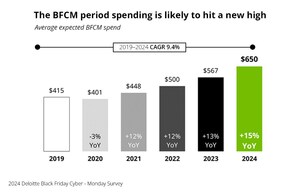NEW YORK, Feb. 11, 2014 /PRNewswire/ -- Shared spectrum can complement but does not replace the need for exclusive-access spectrum in the provision of mobile broadband. Released today, the Deloitte/ GSMA report, "The Impacts of Licensed Shared Use of Spectrum," offers insight into how strict limitations associated with Licensed Shared Spectrum Access (LSA) agreements - such as shorter terms, geographic or time use restrictions, lack of certainty and small allocations - can significantly reduce the likelihood of a mobile operator to invest in shared spectrum access. The report indicates that the potential economic benefits derived from spectrum sharing are ultimately less than those achieved through exclusive access spectrum.
(Logo: http://photos.prnewswire.com/prnh/20120803/MM52028LOGO-a)
"Governments and regulators around the world are working to bring more spectrum to market for the mobile industry, but are grappling with how to identify enough viable spectrum that can be exclusively licensed in the timeframe to meet the anticipated demand offset by the burgeoning usage of mobile broadband," said Craig Wigginton, vice chairman, Deloitte LLP and U.S. telecommunications sector leader. "While ongoing technology developments are opening new opportunities to viably share a common spectrum band, the restrictions and complexities inherent in sharing reduce the economic value of the spectrum compared to exclusive use, and indicate that shared spectrum may be better viewed as a complement to, rather than a replacement of, exclusively licensed spectrum."
The report contends that dynamic sharing is technologically possible, but it can create significant limitations on the commercial business case of an operator. Negotiations between the incumbent user, mobile operator and regulator should allow maximum flexibility and innovation in finding sharing solutions that maximize potential for the shared use and thus the potential for economic growth. In cases with strict or uncertain sharing conditions, a solution in which the incumbent migrates into a subset of frequencies to allow exclusive licensing of the remaining frequencies for mobile operators may be more efficient and produce a better result for the economy than sharing the entire band.
The report revealed the following key findings, based on a model that assesses the prospective value of two potential Licensed Shared Access scenarios: the release of 100 MHz in the 3.5 GHz band in the United States from 2016 and of 50 MHz in the European Union in the 2.3 GHz band from 2020. The many variables involved and the additional risks, complexities and uncertainties that come with spectrum sharing mean that each sharing opportunity should ideally be evaluated on a case-by-case basis, making a generalized approach infeasible. Key findings from the report include:
United States:
- Exclusive spectrum licensing in the 3.5 GHz spectrum band would add US $260 billion (€192 billion) to the U.S. economy in the period 2016-2030.
- In the case that sharing terms strictly limit the use of spectrum by mobile operators, this value would be sharply reduced to US $210 billion (€155 billion) or as little as US $7 billion (€5 billion).
European Union:
- For the same period, exclusive licensed spectrum in the 2.3 GHz band could add US $116 billion (€86 billion) to the EU's economy.
- Shared licensing could sharply reduce economic benefits to US $95 billion (€70 billion) or as low as US $6.7 billion (€5 billion), due to a lack of common approach in spectrum allocation across the member states, combined with significant geographic and timing exclusions as well as potential contracting limitations.
In either scenario, the report concludes that the economic value could decrease to zero if geographic and time exclusions or licensing limitations become severe enough to discourage operator investment altogether.
The report is released amidst continued rapid growth in mobile traffic and consumer demand for smartphones, tablets and other devices that provide access to communications and information services. This dramatic growth is placing increased pressure on mobile network operators to ensure adequate capacity and performance and on regulators to provide access to the additional spectrum critical to capacity expansion. Further, the study finds that the release of exclusive-access spectrum for mobile broadband offers wider socio-economic benefits for the United States and European Union over the period 2016-2030, including future job creation. It is estimated that the deployment of mobile broadband would generate approximately 2.1 million jobs in the United States and nearly 1.6 million jobs in the European Union cross this period.
For more information on Deloitte's "The Impacts of Licensed Shared Use of Spectrum Report," please visit: http://bit.ly/LEXEmA. Connect with us on Twitter: @DeloitteTMT, @GSMA and #MWC14.
About Deloitte's Technology, Media & Telecommunications Practice
Deloitte's technology, media & telecommunications practice serves more than 1,400 clients in the U.S., including the vast majority of market category leaders across all sector segments. Deloitte practitioners, many with direct industry experience, deliver a breadth of services including professional audit, consulting, enterprise risk management, financial advisory and tax. The practice is also home to the Deloitte Center for the Edge, which conducts original research and develops substantive points of view for new corporate growth. The Silicon Valley-based Center helps senior executives make sense of and profit from emerging opportunities on the edge of business and technology.
As used in this document, "Deloitte" means Deloitte LLP and its subsidiaries. Please see www.deloitte.com/us/about for a detailed description of the legal structure of Deloitte LLP and its subsidiaries. Certain services may not be available to attest clients under the rules and regulations of public accounting.
SOURCE Deloitte
WANT YOUR COMPANY'S NEWS FEATURED ON PRNEWSWIRE.COM?
Newsrooms &
Influencers
Digital Media
Outlets
Journalists
Opted In






Share this article